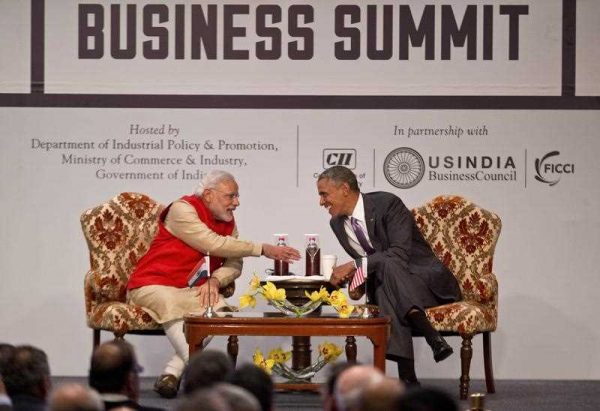India, on the verge of economic transformation, is seeing the anticipated adverse impacts of the TPP dominate domestic discussion. Yet contrary to popular belief, this could be a rare opportune moment for Prime Minister Narendra Modi to push for much-awaited economic reform and re-integrate India into the global economy.
India’s most immediate concerns over the TPP lie in trade and investment diversion. The estimate of how much trade diversion India would face varies from study to study. A conservative estimate envisages US$4–5 billion in losses over 10 years while annual losses of US$50 billion are considered plausible if more countries, including China, join the bloc.
India is particularly concerned about losing its market share in countries with which it has not signed an FTA, such as the United States, India’s largest export destination. Its trade with Australia and New Zealand could also be hurt if India does not hurry itself to conclude the ongoing FTA negotiations with these two countries. Given that the G20 Summit and WTO Ministerial Conference are both scheduled before the end of the year, it is uncertain whether India’s Ministry of Commerce and Industry has the capacity to conclude an FTA by the end of the year as Australia wishes.
Investment diversion can be even more damaging than trade diversion. In less than two years since he came to power in May 2014, Prime Minister Modi has made 28 foreign trips mainly to attract foreign investment into the country. But a recently-concluded TPP and the prospect of unfettered market access could induce foreign companies to invest in a TPP member rather than in India.
Amid the new government’s relentless efforts to turn around its economy, investment diversion could not only spoil Modi’s flagship initiatives, such as ‘Make in India’ and ‘Smart Cities Mission’, but also dent India’s brimming hopes to re-engage with foreign investors.
Yet Indian experts, media and even the government seem to agree that the most damaging impacts will come from the possibility of the TPP establishing de facto global standards. As a supposedly ‘comprehensive 21st century model’ FTA, the TPP aims to set high standards on intellectual property rights, labour protection, the environment, technical trade barriers, food safety, competition policy and government procurement.
Given that seven countries within the Regional Comprehensive Economic Partnership (RCEP) are also TPP members, they could push for RCEP to adopt TPP-level standards. If it is not to miss out the benefits of international trade and foreign investment, India, whether it likes it or not, would have to improve its capacities and upgrade its standards to a global level in spite of domestic resistance and the inevitable cost.
Becoming a responsive consumer of the global rules rather than a proactive actor could result in less bargaining power for India in global, regional and bilateral negotiations. With altered bargaining power and a weakened negotiating position, India’s economic-take off could be put on hold, let alone its aspiration to become a global power.
India’s rising concerns with the TPP are not incomprehensible. Yet the implementation of the TPP and higher global standards as a result could be an opportunity for Modi to bring about the significant economic reforms he has been advocating.
In fact, India is not the first country to use international agreements as a means of influencing domestic policy. Eastern European countries used the requirements of EU membership as a means of consolidating market economy reforms. Costa Rica and Peru leveraged their FTA negotiations with the United States to push for domestic reforms, improve governance and foster a more enabling legal environment.
When domestic policy becomes a source of market failure, international agreements become even more indispensable for a government to push for policy change. With the world pushing for India to adopt higher standards, Modi will not have any better excuse than the TPP to convince Indian industries as well as the electorate to implement economic reforms sooner rather than later.
In the wake of the conclusion of the TPP negotiations, Indian experts have begun to assert that India needs to resume, (re)negotiate and conclude bilateral FTAs that are in the pipeline, particularly those with the European Union, Canada and Australia. They are also pushing for India to take more realistic positions on RCEP so that the only mega FTA of which India is part can be enacted in parallel with the TPP. India’s accession to APEC and the conclusion of a Bilateral Investment Treaty with the United States, although uncertain, are considered to be other measures that could mitigate and minimise adverse impacts of the TPP.
Without a clear domestic consensus on the benefits of freer trade and higher standards, it would be difficult for the Indian government to sit on a negotiating table, agreeing on easier market access. Yet the TPP, at least, has served as a stimulant to ignite urgent discussions on the necessity of fast-tracking bilateral and regional FTAs within India. India will have to respond swiftly if it wishes to turn the tables in its favour.
Soyen Park, currently based in New Delhi, India, is a PhD candidate in the Graduate School of International Studies, Korea University.

